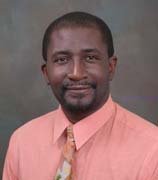Sometimes you think you know a person, but you really don’t. This was the impression that I got when I attended Preston Allen’s reading from Jesus Boy at Books and Books on Friday, March 19, 2010.
Wearing his now trademark hat, Preston read two chapters from Jesus Boy, his February-June romance about Elwyn Parker and Elaine Morrisohn. In the sections, “The Little Preacher” and “The Boy from Opa-Locka,” we were introduced to Benny, Elwyn’s half-brother, and Benny’s girl friend, Marie. The contrasts between the hyper-religious Elwyn and the secular Benny could not have been more distinct, and Preston’s reading clarified the differences in worldview of these two brothers-from-another-mother.
It was, however, when Preston opened the floor to questions that I was in for a shocker. One of the first questions was innocent enough: “How long did it take you to write the book?”
Preston gave the details: “I began the first drafts of Jesus Boy when I was about eighteen and finished it when I was closer to Sister Morrisohn’s age. When I began the book, I knew the character of Elwyn very well. By the time I finished the novel, I knew Sister Morrisohn a lot better.”
Fair enough. Then came a question that I thought I could have answered: “Who were your influences in writing Jesus Boy?”
When Preston said “John Cheever” I almost fell off the chair. John Cheever! How did a white New England writer come to influence a Black, Honduran writer who now lives in Miami?
Preston explained:
It was "The Country Husband" that inspired "The Leap," the first section of Jesus Boy that I wrote.
Francis Weed is in a plane that almost crashes, but doesn't. The plane emergency-lands safely in a field, and since no one is injured, the rescue workers at the site get the passengers home at almost the exact time they would have gotten home on a regular work day. Francis tries to tell his wife that he was in an extraordinary event, a plane that almost crashed, the same one being reported on the radio playing behind her, but she is too immersed in the petty day to day problems of the suburban middle class housewife to even listen to him. In fact, once he is sucked back into that routine, no one will listen to him about the plane or anything, except for the teenaged baby sitter, with whom he begins a troublesome affair.
I was married to my first wife at the time. And sucked into a middle class day to day routine of my own, I found that many of my near fatal crashes went ignored. Sister Morrisohn was my baby sitter, so to speak...I understood Cheever's story completely.
And I thought I knew Preston’s work! The audience questions made me aware of some aspects of his work of which I was unaware, and it’s one of the reasons why I like to attend author readings—I never know what extra stuff I’ll learn that will affect my reading of the text. And many times it takes an attentive audience to bring out the best in a writer.
When Preston talked about the relationship between Jesus Boy and Cheever’s “The Country Husband,” it suddenly changed how I saw both stories. I guess it was like what T.S. Eliot said in “Tradition and the Individual Talent”:
The existing monuments form an ideal order among themselves, which is modified by the introduction of the new (the really new) work of art among them. The existing order is complete before the new work arrives; for order to persist after the supervention of novelty, the whole existing order must be, if ever so slightly, altered; and so the relations, proportions, values of each work of art toward the whole are readjusted; and this is conformity between the old and the new.
Preston has changed how I read Cheever and I will certainly re-read “The Country Husband.” If I’d known about the relationship before the reading, I would have liked to follow up with certain clarifications.
But I guess that will be up to his audiences in New York at the PEN World Voices Festival where he will be reading at Joe’s Pub, 425 Lafayette Street, New York City on Thursday, April 29, 2010 @ 7–8:30 p.m. and at Scandinavia House, 58 Park Avenue, New York City, on Friday, April 30, 2010 @ 3:30–5 p.m.
It's worth looking forward to.
About the author:
Preston L. Allen, a recipient of a State of Florida Individual Artist Fellowship, is the author of the critically acclaimed novel All or Nothing (Akashic) and the award-winning collection Churchboys and Other Sinners (Carolina Wren Press). His stories have appeared in numerous magazines and journals and have been anthologized in Brown Sugar (Penguin), Miami Noir (Akashic), and Las Vegas Noir (Akashic). He lives in South Florida.





